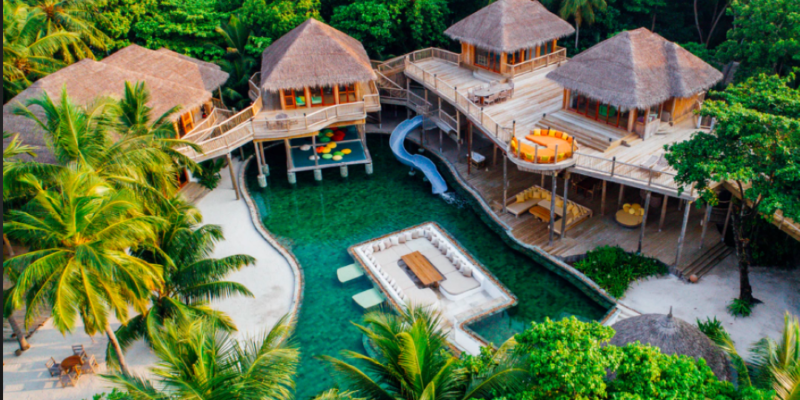The travel sector has seen a notable transition to sustainability in recent years. Travellers are looking for environmentally responsible solutions that fit with their values as they become more conscious of their impact on the environment. The emergence of sustainable hotels, where eco-friendly practices are now required rather than merely a fad, is one of the biggest shifts. By incorporating sustainability into every facet of their business, from trash reduction programs to energy-efficient construction, these hotels are redefining luxury. This change improves the visitor experience by providing a distinctive fusion of comfort, luxury, and ecological responsibility, in addition to being good for the environment.
Innovations in Green Building and Design
Sustainable hotels are at the forefront of innovative building practices, focusing on reducing their environmental footprint while enhancing guest comfort.
Energy Efficiency and Renewable Resources
One of the hallmarks of sustainable hotels is their commitment to energy efficiency. Many establishments are now equipped with solar panels, wind turbines, and geothermal systems, significantly reducing their reliance on fossil fuels. For instance, some hotels use advanced building materials with high thermal insulation properties, minimizing the need for heating and cooling. These green technologies not only reduce energy consumption but also lower operational costs, making them economically viable in the long run.
Waste Management and Water Conservation
Another essential component of sustainable hotel design is water saving. In an effort to use less water, hotels are installing low-flow fixtures, greywater recycling systems, and rainwater harvesting systems. Rainwater harvesting systems, for instance, are used by certain tropical resorts to collect and store rainwater for non-potable needs like irrigation. In order to drastically reduce landfill waste, a lot of hotels are also investing in waste management systems that promote composting and recycling. These procedures not only preserve resources but also encourage a sustainable culture among visitors and employees.
Eco-Friendly Materials for Construction
When designing a hotel that is sustainable, material selection is essential. Nowadays, a lot of hotels use non-toxic, recyclable, and locally sourced materials. For example, bamboo is a popular material for flooring and furniture because of its quick growth and little environmental impact. In addition, low-VOC (volatile organic compound) paints and finishes are utilized to enhance indoor air quality, guaranteeing visitors a healthier atmosphere. In addition to helping to preserve the environment, these sustainable building techniques also improve the hotel rooms’ comfort and visual appeal.
Eco-Friendly Operations and Visitor Involvement
Beyond only using green building techniques, sustainable hotels actively involve visitors in their sustainability initiatives, resulting in a comprehensively eco-friendly stay.
Green Standards and Certifications
A lot of environmentally conscious hotels are working toward green certifications like EarthCheck, Green Key, and LEED (Leadership in Energy and Environmental Design). The hotel’s dedication to sustainability is demonstrated by these certificates, which bear witness to its strict adherence to waste management, water conservation, and energy efficiency standards. As an illustration, a hotel that has earned LEED certification has put policies in place to employ sustainable building materials, enhance interior air quality, and consume less energy and water. Guests can be reassured by these credentials that their visit is helping to conserve the environment.
Local Sourcing and Sustainable Dining
Using seasonal, organic, and local ingredients, sustainable hotels are transforming their dining offerings. Many hotels reduce the carbon footprint associated with transportation by partnering with local farmers or having on-site gardens to supply fresh produce. Furthermore, a few hotels have implemented zero-waste kitchens, which compost or recycle food wastes to reduce waste. These methods improve the taste and quality of the food while also boosting local economies and providing customers with a distinctive and sustainable dining experience.
Vacation Programs and Sustainable Facilities
Many hotels provide eco-friendly services and initiatives to encourage visitors to participate in their sustainability efforts. These programs encourage visitors to embrace sustainable practices by providing things like bike rentals, electric vehicle charging stations, and reusable water bottles and shopping bags. Even cooking courses with an emphasis on sustainable cuisine, recycling tours, and guided nature hikes are among the sustainability-related programs and activities that some hotels provide. In addition to improving the visitor experience, these initiatives promote environmental responsibility and a sense of community.
Case Studies and Upcoming Developments in Eco-Friendly Hospitality
Success stories from all around the world demonstrate how sustainable hotels are becoming more and more popular. These hotels are leading the way in the business and proving that luxury and sustainability can coexist harmoniously. Two examples of these case studies are shown below;
1. French Polynesia’s Brando
The Brando in French Polynesia is among the most famous instances of environmentally friendly accommodation. This opulent resort uses a combination of solar panels, wind turbines, and a biofuel power plant to generate all of its electricity from renewable sources. Additionally, the Brando has a state-of-the-art waste management system that recycles 90% of its trash and uses the remainder to produce energy. The Brando’s dedication to sustainability allows it to offer a distinctive, green experience without sacrificing comfort or elegance.
2. Bhutan’s Six Senses
Another excellent example of sustainable hospitality is Six Senses Bhutan. This upscale hotel brand uses locally sourced materials, encourages the use of energy-efficient technologies, and combines traditional Bhutanese design with ecological practices. The hotel’s restaurants prioritize using organic and locally produced food, and its waste management system is centred on composting and recycling. Additionally, Six Senses Bhutan provides cultural experiences that inform visitors about Bhutan’s environmental conservation initiatives and foster a close bond between them and the surrounding ecosystem.
Upcoming Trends: Innovation and Technology
Technological breakthroughs and the increasing demand for sustainable experiences are driving greater innovation in the future of sustainable hotels. New sustainable hotels are starting to come equipped with smart technology as standard, like Internet of Things (IoT) devices, smart thermostats, and energy-efficient lighting systems. Furthermore, it is anticipated that the adoption of new waste-to-energy technologies, biodegradable materials, and sustainable packaging would rise. The hospitality sector is expected to witness a rise in partnerships with environmental organizations, augmented investments in eco-friendly technologies, and heightened emphasis on developing carbon-neutral properties as long as tourists maintain their emphasis on sustainability.
Concluding remarks: A Sustainable Outlook for the Hospitality Sector
In the hospitality sector, luxury and sustainability are no longer mutually exclusive, as seen by the growth of sustainable hotels. These hotels demonstrate how sustainability can improve comfort and elegance while simultaneously lessening their negative effects on the environment and improving the visitor experience. The trend toward sustainable hospitality is expected to increase as more tourists look for environmentally friendly accommodations, encouraging the whole sector to implement greener procedures. We can all help to a better planet by booking sustainable hotels, which will make our travels meaningful in addition to being fun.









